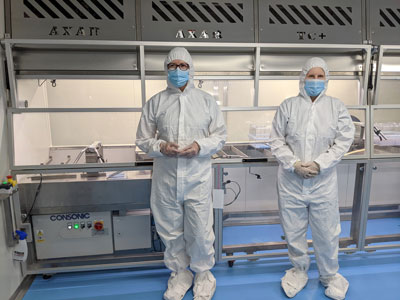5/1/2024
An Automated TC-propagation Machine From Down Under
Chris Beytes

If you’ve ever been to a tissue culture lab, you know that there's much hand-labor involved in dividing up the meristem cells, putting them in agar, then dividing up the tiny TC plantlets and replanting them in community pots to grow on until they’re finally large enough to plant in soil and put in a greenhouse. That’s a lot of manual labor.
Lowes TC in Tumbi Umbi, Australia (about 60 miles north of Sydney), has been working on the technology for automating the TC process for a decade and now Greg Lowes said he’s sold the company to NXT BioScience in order to commercialize the technology.
Said Greg, “It is now our goal to change every horticultural industry worldwide that needs clonal high-health propagation.”
Lowes has built prototypes of two machines, “AXAR” for vertical-stem plants and “AXAL” for basal-branching plants. Both AX machines work by taking the TC growing in bioreactors, cutting the plants apart and then placing them into more bioreactors for further growth, repeating the process until they have the numbers required, at which time the AX machine will cut the plants a final time, putting them on rooting media in a bioreactor, and after a final few weeks of growth these will be ready for transplanting—presumably by an automatic transplanter.
Both AX machines currently produce between 2,000 and 5,000 plants per hour, reducing their internal tissue culture labor costs by more than 94%, Greg said.
“This is huge, and makes plant tissue culture done this way cheaper than cuttings and URCs,” Greg said. He added that the next machines they build should be much faster.
They didn’t just have to invent a propagation machine, they also had to reinvent the bioreactors used to produce the tissue culture to have a large opening to allow the machine full access to the bioreactor without negatively impacting contamination rates. The new bioreactors took three years of development work. Lowes TC has applied for multiple patents for these inventions around the world.
We've been hearing about another TC-automation technology coming from Germany. Greg commented on that in his press release, saying, “The only competing machine to ours seems to be the RoboCut from Germany and we believe we have several competitive advantages to that option.”
As for the sale of his company, Greg stated, “All of this research and development took money, and the next step of full commercialization needed a lot more money. NXT BioScience and their investors have come in to supply us with the staff and capital required to commercialize our new technology to the entire industry worldwide.” Greg will stay on as Director of R&D.
“Stand by for big change if you do [plant tissue culture],” he said.
Greg added that he would like to hear from tissue culture labs looking to be involved in the commercialization of the technology. You can email him at
greg@lowestc.com.au. GT